中考英语阅读复习课 课件
图片预览
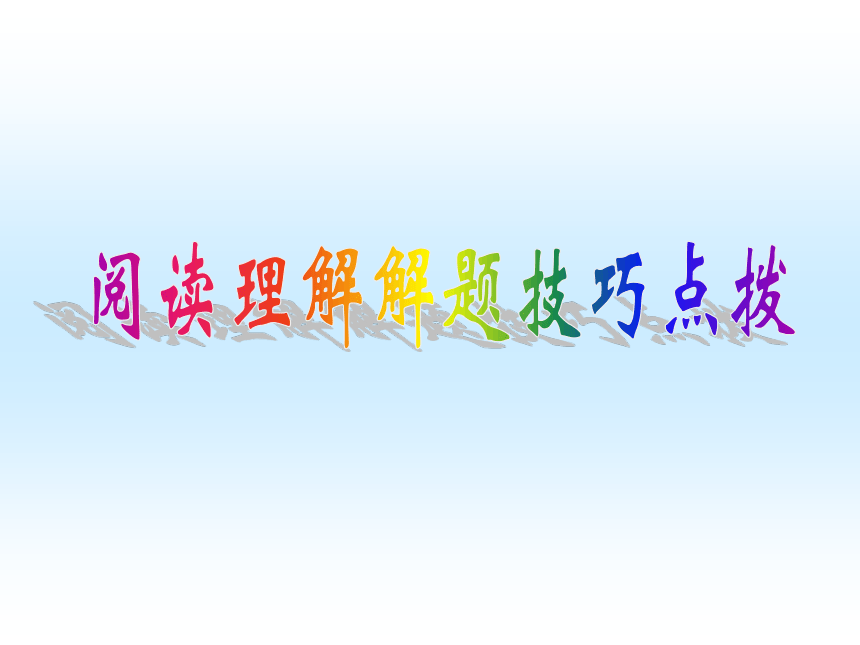
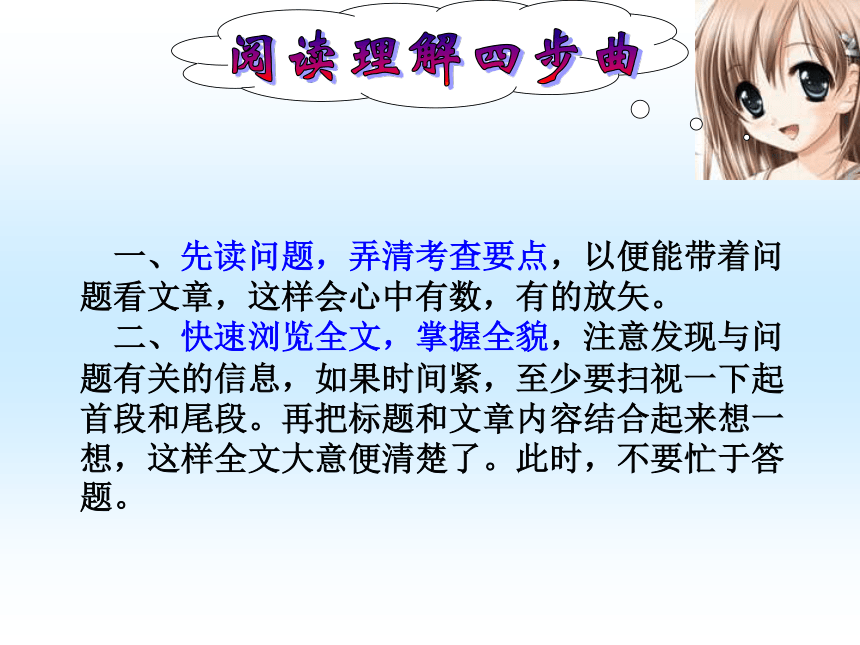

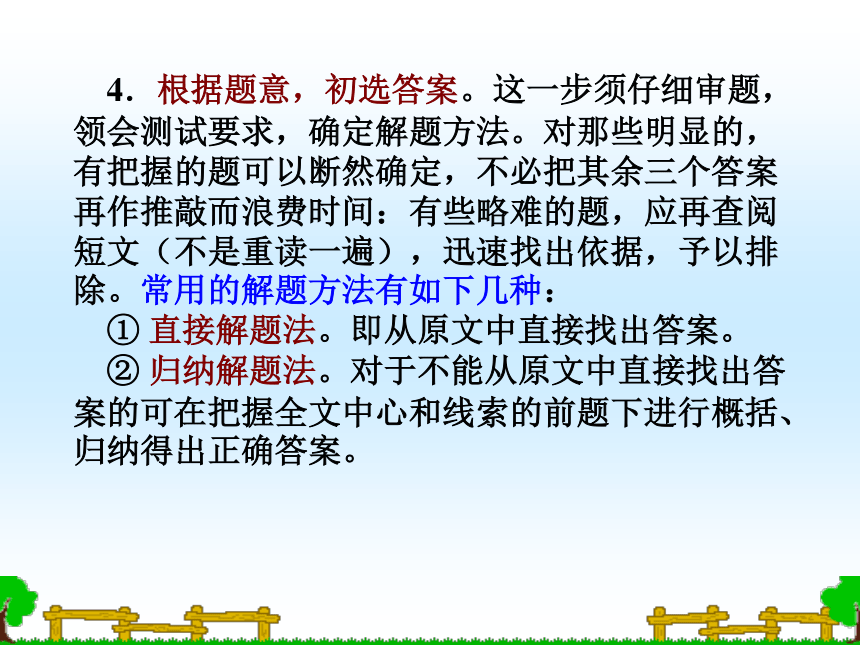
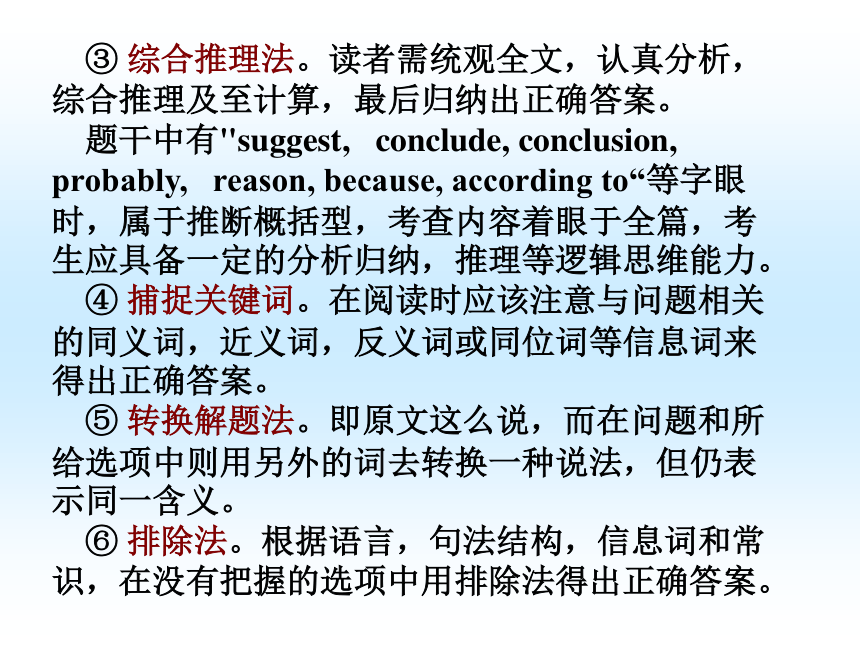
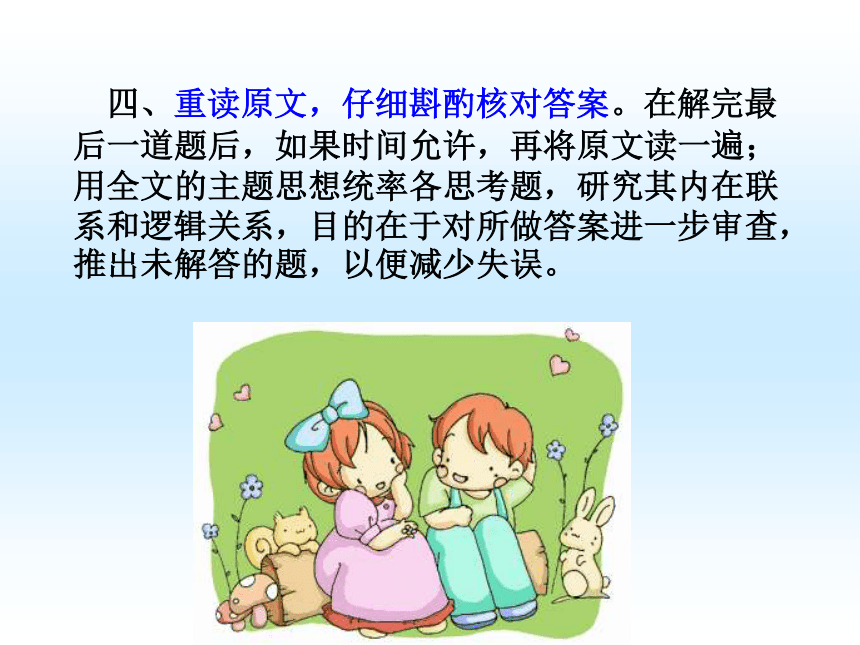
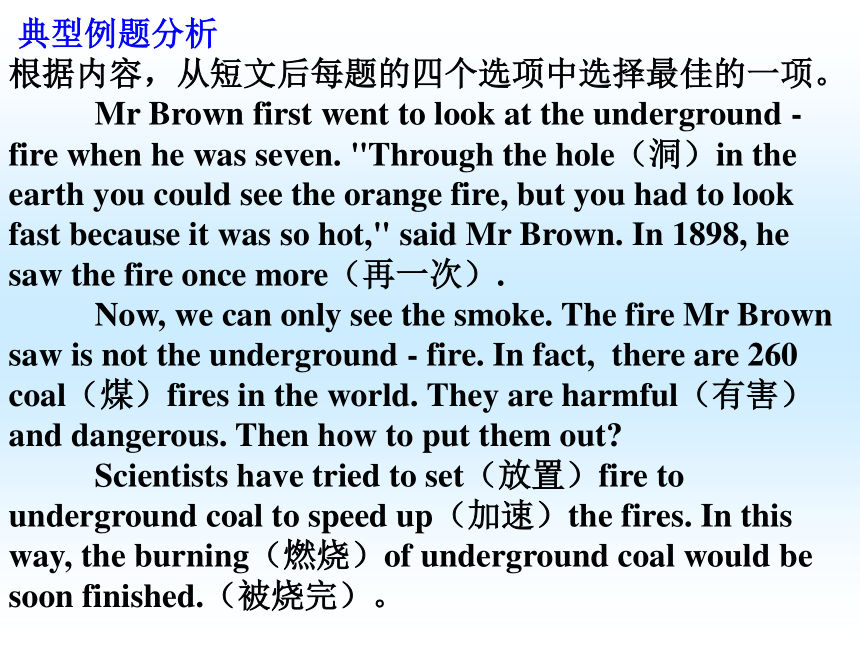
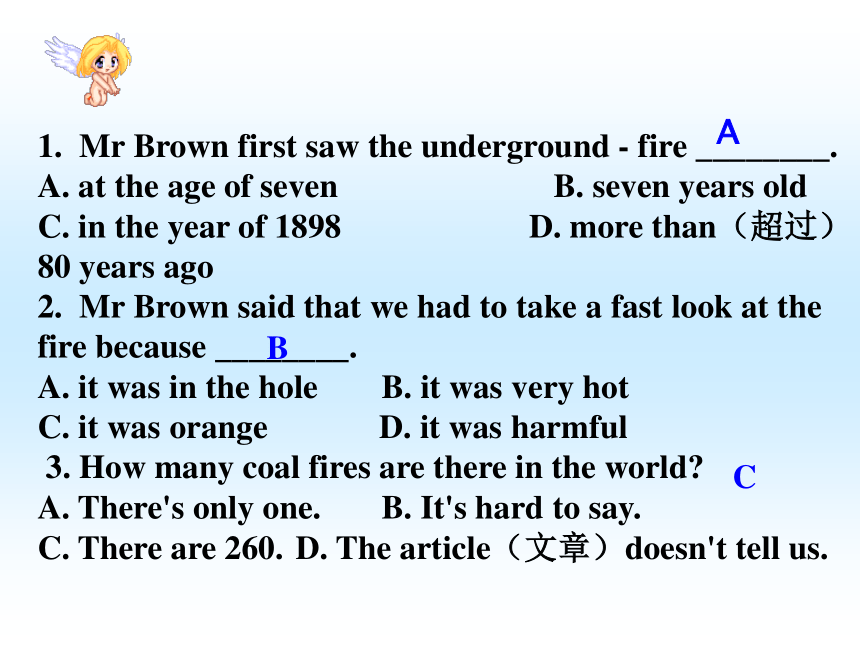
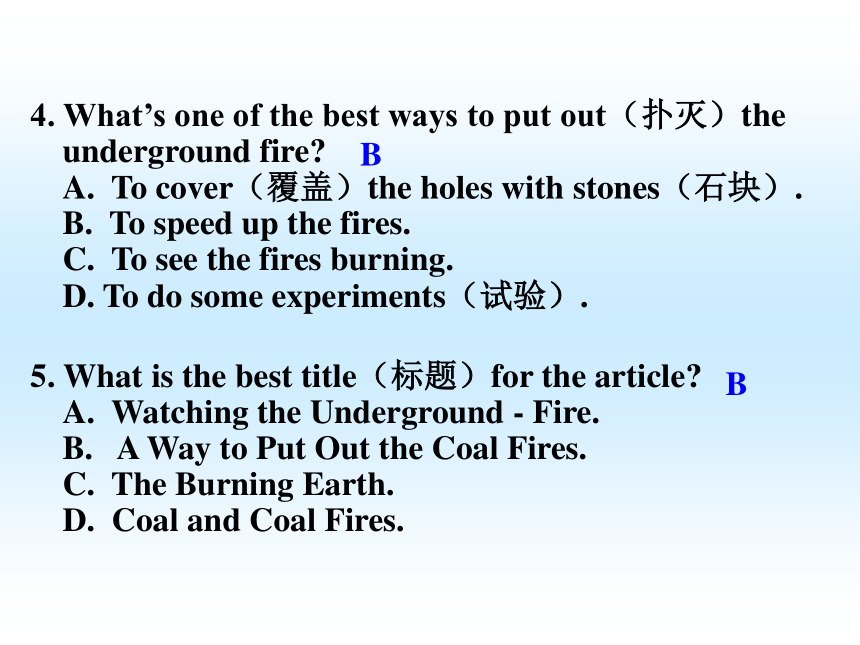
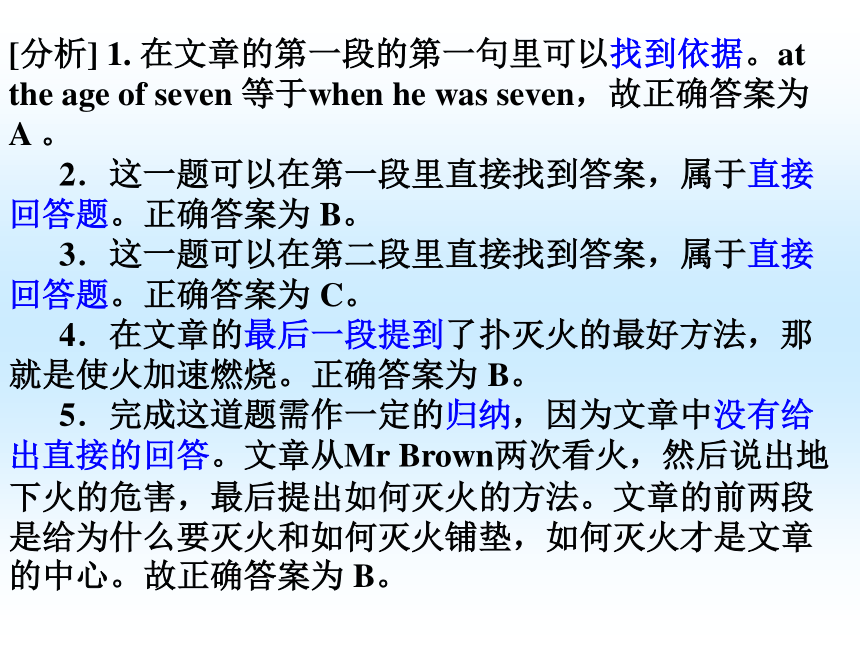
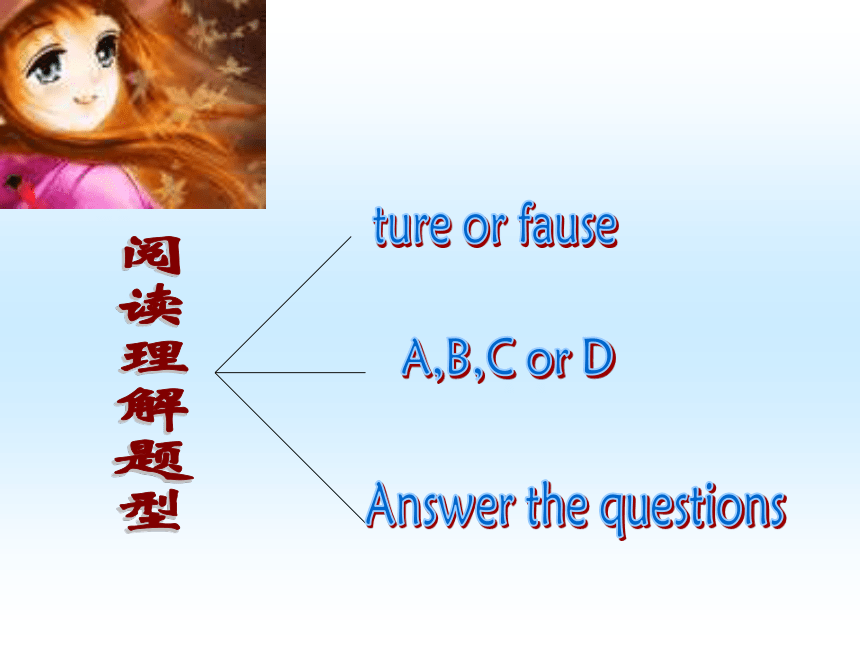
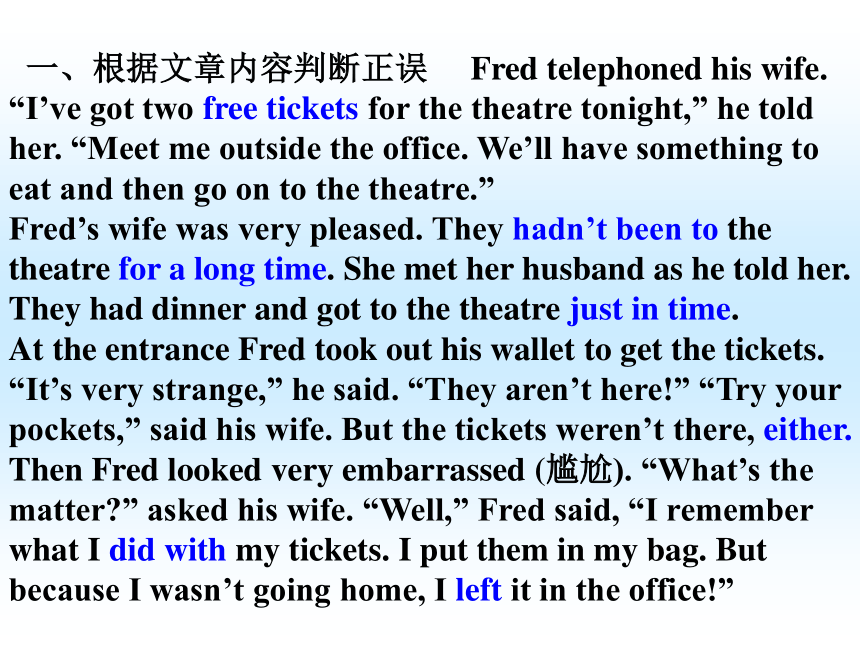
文档简介
(共38张PPT)
一、先读问题,弄清考查要点,以便能带着问题看文章,这样会心中有数,有的放矢。
二、快速浏览全文,掌握全貌,注意发现与问题有关的信息,如果时间紧,至少要扫视一下起首段和尾段。再把标题和文章内容结合起来想一想,这样全文大意便清楚了。此时,不要忙于答题。
三、细读原文,捕捉相关信息词,掌握短文细节内容。这是解题的关键,应特别注意以下几点:
1. 抓住四个"W"和一个"H",就是边读边用铅笔做些标记,把What (事件),When(时间),Where(地点),Why(原因),How(经过)划出来。抓住了四个“W”和一个“H”,就抓住了文章的全貌,一些直接性的问题便可解决。
2.抓住连接词及起关键作用的副词、代词、介词、插入语等。因为这些词具有因果,让步,递进,转折,指代,列举及承上启下等各种连接上下文的特殊功能。这对考生分清文章层次,辨明各种关系,了解人物心理,推断作者意图,进行逻辑推理等手段来分析难点,都具有举足轻重的作用。
3. 注意领会文章的寓意。
4.根据题意,初选答案。这一步须仔细审题,领会测试要求,确定解题方法。对那些明显的,有把握的题可以断然确定,不必把其余三个答案再作推敲而浪费时间:有些略难的题,应再查阅短文(不是重读一遍),迅速找出依据,予以排除。常用的解题方法有如下几种:
① 直接解题法。即从原文中直接找出答案。
② 归纳解题法。对于不能从原文中直接找出答案的可在把握全文中心和线索的前题下进行概括、归纳得出正确答案。
③ 综合推理法。读者需统观全文,认真分析,综合推理及至计算,最后归纳出正确答案。
题干中有"suggest, conclude, conclusion, probably, reason, because, according to“等字眼时,属于推断概括型,考查内容着眼于全篇,考生应具备一定的分析归纳,推理等逻辑思维能力。
④ 捕捉关键词。在阅读时应该注意与问题相关的同义词,近义词,反义词或同位词等信息词来得出正确答案。
⑤ 转换解题法。即原文这么说,而在问题和所给选项中则用另外的词去转换一种说法,但仍表示同一含义。
⑥ 排除法。根据语言,句法结构,信息词和常识,在没有把握的选项中用排除法得出正确答案。
四、重读原文,仔细斟酌核对答案。在解完最后一道题后,如果时间允许,再将原文读一遍;用全文的主题思想统率各思考题,研究其内在联系和逻辑关系,目的在于对所做答案进一步审查,推出未解答的题,以便减少失误。
典型例题分析
根据内容,从短文后每题的四个选项中选择最佳的一项。
Mr Brown first went to look at the underground - fire when he was seven. "Through the hole(洞)in the earth you could see the orange fire, but you had to look fast because it was so hot," said Mr Brown. In 1898, he saw the fire once more(再一次).
Now, we can only see the smoke. The fire Mr Brown saw is not the underground - fire. In fact, there are 260 coal(煤)fires in the world. They are harmful(有害)and dangerous. Then how to put them out
Scientists have tried to set(放置)fire to underground coal to speed up(加速)the fires. In this way, the burning(燃烧)of underground coal would be soon finished.(被烧完)。
1. Mr Brown first saw the underground - fire ________.
A. at the age of seven B. seven years old
C. in the year of 1898 D. more than(超过)80 years ago
2. Mr Brown said that we had to take a fast look at the fire because ________.
A. it was in the hole B. it was very hot
C. it was orange D. it was harmful
3. How many coal fires are there in the world
A. There's only one. B. It's hard to say.
C. There are 260. D. The article(文章)doesn't tell us.
A
B
C
4. What’s one of the best ways to put out(扑灭)the underground fire A. To cover(覆盖)the holes with stones(石块). B. To speed up the fires. C. To see the fires burning. D. To do some experiments(试验).
5. What is the best title(标题)for the article A. Watching the Underground - Fire. B. A Way to Put Out the Coal Fires. C. The Burning Earth. D. Coal and Coal Fires.
B
B
[分析] 1. 在文章的第一段的第一句里可以找到依据。at the age of seven 等于when he was seven,故正确答案为 A 。
2.这一题可以在第一段里直接找到答案,属于直接回答题。正确答案为 B。
3.这一题可以在第二段里直接找到答案,属于直接回答题。正确答案为 C。
4.在文章的最后一段提到了扑灭火的最好方法,那就是使火加速燃烧。正确答案为 B。
5.完成这道题需作一定的归纳,因为文章中没有给出直接的回答。文章从Mr Brown两次看火,然后说出地下火的危害,最后提出如何灭火的方法。文章的前两段是给为什么要灭火和如何灭火铺垫,如何灭火才是文章的中心。故正确答案为 B。
一、根据文章内容判断正误 Fred telephoned his wife. “I’ve got two free tickets for the theatre tonight,” he told her. “Meet me outside the office. We’ll have something to eat and then go on to the theatre.”
Fred’s wife was very pleased. They hadn’t been to the theatre for a long time. She met her husband as he told her. They had dinner and got to the theatre just in time.
At the entrance Fred took out his wallet to get the tickets. “It’s very strange,” he said. “They aren’t here!” “Try your pockets,” said his wife. But the tickets weren’t there, either.
Then Fred looked very embarrassed (尴尬). “What’s the matter ” asked his wife. “Well,” Fred said, “I remember what I did with my tickets. I put them in my bag. But because I wasn’t going home, I left it in the office!”
( ) 1. One day, Fred was given the tickets
for the theatre. ( ) 2. Fred and his wife went to the
theatre quite often. ( ) 3. Fred wanted to meet his wife in a
restaurant. ( ) 4. They reached the theatre neither
late nor early. ( ) 5. Then Fred couldn’t find his tickets and remembered what he had done with the tickets.
1、T 因为第一段中提到Fred told his wife
“I’ve got two free tickets…” “free” 此处是免费的意思。 2、F 第二段中提到“They hadn’t been to the theater
for a long time.” 3、F 第一段中Fred说“Meet me outside the office.” 4、T 第二段中“in time”是及时的意思。5T 结尾处提到的。
David McConnell sold books from door to door. Housewives(家庭主妇)were not interested in the books. Usually before he had enough time to say anything about his books, the women closed their doors. But he didn’t give up. McConnell decided to bring each of them a present, a small bottle of perfume(香水)made by himself. He soon found that the women liked the perfume better than the books. He stopped selling books to sell perfume instead and started his own company “Avon”, which is a great success.
When you do nothing, you learn nothing. But when you try, even though you are not successful, you will learn what doesn’t work and that puts you closer to what will work. It doesn’t matter how many times you are not successful. It does matter that you will be successful one day.
Edison was not on the way to success until people bought his first invention. Success once is enough for Edison. And the same for you—success once is enough. ( ) 1. McConnell was successful as a book-seller. ( ) 2. McConnell hoped those women would buy his books if he brought them each a present. ( ) 3. If you do nothing at all, you will never be successful. ( ) 4. Edison was successful at the very beginning. ( ) 5. The writer encouraged us to try as much as we can.
F T T F T
1、F 从第一段“He stopped selling books to sell perfume stead.”,可以判断出他在推销书方面并不成功。 2、T 第一段第三行提到“McConnell decided to bring each of them a present,…”。 3、T 这句是第二段前两句的解释。
4、F 最后一段,第一句说明Edison 的发明被人们认可后才走上了成功之路。 5、T 第二段中作者提出了自己的观点。
Sociologists(社会学家), working in western countries, have found that a large number of women wished they had been born men. The number is said to be as high as 60% in Germany.
“Women often wish they had the same chances as men have, and think it is still men’s world,” said Dr James Helen, one of the sociologists who did the study.
Many men say that they have more duties than women. A man has to make money to support(养活)his family and to make the important decision, so it is right for men to be paid more. Some are even against their wives working at all. When wives go out to work, they say, the home and children cannot be
taken good care of. If women take full-time jobs, they won’t be able to do what they are best at doing: making a nice home and bringing up the children. Some women disagree. They say they want to get out of their homes and to have freedom(自由) to choose between work and home life. Women have the right of equal pay and equal chances(平等机会). Anne Harper has a very good job. She also believes in “Women’s Liberation(解放).” “I don’t wish I were a man, ”she says, “and I don’t think many women do. But I do wish people would stop treating(对待) us like second—class people.
At work, for example, we usually do the work that men do but get paid less. There are still a lot of jobs only to men—usually they are the best ones. If you are a man, you have a much better chance of living a wonderful life. How many women scientists are there…or engineers ”
( ) 1. many men think__________. A. women can’t do what men can
B. men have to work much harder than women C. men can make money more easily than women D. women’s duty is mainly to do housework at home
1、D 这是一道概括主旨的题,答此题的依据是第三段内容。这段开头两句话说的是重男,那么不言而喻,家务活和教育子女的任务应有妇女承担;另有一些男士则公开反对女士外出工作。可见,不少男士认为妇女的主要职责是在家料理家务。
( ) 2. Some women have different ideas, They say that__________. A. women need chances to go out of the home more often B. women want more freedom in deciding the kind of life they want C. if women are given equal pay, they can do everything instead of men D. women are no longer interested in taking care of their homes
2、B 一些妇女持不同观点,文中第四段反映了他们的意见。这也正是文章的中心思想的写作意图----争取人权平等,妇女自由,男女平等。
( ) 3. Anne Harper didn’t wish to be a man__________. A. because she believed in “Women’s Liberation” B. but she wished to get the same jobs as men C. because she had got a good job
D. but she wished to treated the same as a man
3、D 安妮.哈珀不希望自己是男士,但她希望社会像对待男士一样对待她。该题是一考查细节的题,答案在最后一段。
( ) 4. Anne Harper thought that__________. A. women should live a better life than men
B. women should be really liberated C. women should be given better jobs than men D. women should live a more wonderful life
4、B 安妮.哈珀的想法正是作者的意图,如最后一段写到:She also believes in “Women’s Liberation.” 然后她又列举了许多事实,其立意还是为了说明这一正确论点。
( ) 5. Which of the following is not true according to the passage A. There are more men scientists, engineers than women ones. B. Women are second—class people, so they shouldn’t live a better life. C. Women do the same jobs as men, but get paid less than men. D. There are some best Jobs that women have few chances to take.
5、B 选题B的观点在文中没有出现。文中男士尽管摆出种种理由,但还没有人敢明目张胆地发表歧视妇女的观点,即把妇女作为二等公民,认为妇女不应生活的更美好。
Have you ever held a toy balloon (气球) They are very light. But there are much bigger balloons. These balloons can fly very high up in the sky. They are big enough to carry people. They are called hot-air balloons.
To make a hot-air balloon go up, turn on the burner (燃烧器). That will make the air inside the balloon hotter. Then the balloon will go up.
To make the balloon go down, turn off the burner. The air inside the balloon will get cooler. Then the balloon will go down.
Underneath (在…下面) the balloon there is a large basket. That is where the pilot (飞行员) and the passengers (乘客) go. The burner is just above the basket. You can stand in the basket and turn the burner on and off. The balloon will go where the wind blows it. Do you want the balloon to go somewhere special First make sure the wind is blowing the right way! People have been flying in hot-air balloons for over two hundred years. Before planes it was the only way of flying. Today people fly in hot air balloons for fun. Some people like to race hot-air balloons. The first Hot-Air Balloon World Championship (锦标赛) was held in 1973.
( ) 1. A hot-air balloon is ____________.
A. smaller than a toy balloon
B. bigger than a toy balloon
C. the same as a toy balloon
D. lighter than a toy balloon
1、B 由“But they are much bigger balloons.”可知。这里的比较级是与前面“a toy balloon”相比较。
( ) 2. Where will you sit if you want to fly in the balloon A. Inside the basket.
B. On top of the balloon C. Under the basket
D. Inside the balloon
2、A 这是一篇有关热气球的科普文章,需要考生熟知有关热气球的基本常识。热气球有燃烧器(也可叫加热器),打开燃烧器,气球内气体被加热,气球会上升,反之就下降。气球下面是一个大篮子,飞行员或乘客在此处,燃烧器在篮子上方。热气球总要随风向飞行。
( ) 3. You want the balloon to go up. So you will _____________. A. jump out if the balloon
B. let the air out of the balloon C. make the air inside the balloon hotter D. let the air inside the balloon cool down
3、C 由第二段的叙述可知。
( ) 4. Now you are high up in the sky. If you want the balloon go down, you will _________. A. make your friends get out of the basket B. make a hole in the balloon with a knife C. make the air inside the balloon hotter D. make the air inside the balloon cooler
4、D 由第三段的叙述可知。
( ) 5. Now everything is all right! The balloon is flying across the sky. Where are you going A. Towards the sun.
B. To the seaside. C. Where the wind blows you.
D. To the nearest mountains.
5、C 由第六段的叙述可知。
(4)
Bob was happy. He was at a new school, and the other students were friendly. “Hi, Bob!” they said. But some students said, “Hi, Peter!” Bob didn’t understand. He asked another student, “Why do some students call me Peter ”
“Oh, that’s easy to answer,” the students said. “Pete was a student here last year. Now he goes to a different school. You look like Peter. Some students think that you’re Peter.”
Bob wanted to meet Peter. He got Peter’s address from a student and went to Peter’s house. Peter opened the door. Bob couldn’t believe his eyes. He looked really like Peter! Bob and Peter had the same colour eyes and the same smile. They had the same black hair. They also had the same birthday. And they both were adopted (领养) by two different families. Bob and Peter found out that they were twin brothers. Soon after the boys were born, one family adopted Bob, and another family adopted Peter. Bob’s family never knew about Peter, and Peter’s family never knew about Bob.
Bob and Peter’s story was in the newspaper. There was a photo of Bob and Peter next to the story. A young man named John saw the photo in the newspaper. John couldn’t believe his eyes. He looked really like Bob and Peter! He had the same colour eyes and the same smile. He had the same black hair. He had the same birthday. And he, too, was adopted by another family. Later John met Bob and Peter. When Bob and Peter saw John, they couldn’t believe their eyes. John looked really like them! Why did John look really like Bob and Peter You can guess. Bob and Peter are not twins. Bob, Peter and John are triplets.
1. How did Bob feel at a new school 2. Why did some students mistake Bob for Peter 3. Where did Bob see Peter 4. How did John know the story 5. What does it mean by “triplets”, do you know
1. He was happy. 2. Because Bob looked like Peter very much. 3. In Peter’s house. 4. He knew the story from the newspaper. 5. It means Bob, Peter and John were born on the same day, and they are brothers.
(8)
Everyone bathes in a different way. Most Americans never take a bath. They soap and rinse(冲洗)off under the shower. The English always take a bath. First, they sit in a bathtub full of warm water. Then they soap themselves, and finally, they rinse off the soap, all in the same water. The Japanese on the other hand, first wash with soap in the shower. Then they go and sit in a bathtub full of warm water for twenty minutes or more. Later, others in the family use the same water to sit and relax in.
The Thai(泰国人)do not get into a shower or a bathtub. They stand in a room or area of a house where there is a big jar(罐子)full of water. With a bowl they pour water from the jar on themselves so that other people do not see their bodies. The Thai always wear a long piece of cloth called a pasin around their bodies. They wear this when they are bathing.. Everyone gets clean in a different way. We know that washing is good healthy for us. But this was not true in the past. Up to 1800, most Americans did not bathe because they thought it was bad for them.
What is the passage about
2. Why do people often bathe
3. Who needs a bathtub when he bathes
4. Why do the Thai use a pasin around their bodies when they bathe
5. When did most Americans begin to bathe often
1. The ways people bathe. 2. To make themselves clean. 3. The English and the Japanese. 4. To keep others from seeing their bodies. 5. About 200 years ago.
一、先读问题,弄清考查要点,以便能带着问题看文章,这样会心中有数,有的放矢。
二、快速浏览全文,掌握全貌,注意发现与问题有关的信息,如果时间紧,至少要扫视一下起首段和尾段。再把标题和文章内容结合起来想一想,这样全文大意便清楚了。此时,不要忙于答题。
三、细读原文,捕捉相关信息词,掌握短文细节内容。这是解题的关键,应特别注意以下几点:
1. 抓住四个"W"和一个"H",就是边读边用铅笔做些标记,把What (事件),When(时间),Where(地点),Why(原因),How(经过)划出来。抓住了四个“W”和一个“H”,就抓住了文章的全貌,一些直接性的问题便可解决。
2.抓住连接词及起关键作用的副词、代词、介词、插入语等。因为这些词具有因果,让步,递进,转折,指代,列举及承上启下等各种连接上下文的特殊功能。这对考生分清文章层次,辨明各种关系,了解人物心理,推断作者意图,进行逻辑推理等手段来分析难点,都具有举足轻重的作用。
3. 注意领会文章的寓意。
4.根据题意,初选答案。这一步须仔细审题,领会测试要求,确定解题方法。对那些明显的,有把握的题可以断然确定,不必把其余三个答案再作推敲而浪费时间:有些略难的题,应再查阅短文(不是重读一遍),迅速找出依据,予以排除。常用的解题方法有如下几种:
① 直接解题法。即从原文中直接找出答案。
② 归纳解题法。对于不能从原文中直接找出答案的可在把握全文中心和线索的前题下进行概括、归纳得出正确答案。
③ 综合推理法。读者需统观全文,认真分析,综合推理及至计算,最后归纳出正确答案。
题干中有"suggest, conclude, conclusion, probably, reason, because, according to“等字眼时,属于推断概括型,考查内容着眼于全篇,考生应具备一定的分析归纳,推理等逻辑思维能力。
④ 捕捉关键词。在阅读时应该注意与问题相关的同义词,近义词,反义词或同位词等信息词来得出正确答案。
⑤ 转换解题法。即原文这么说,而在问题和所给选项中则用另外的词去转换一种说法,但仍表示同一含义。
⑥ 排除法。根据语言,句法结构,信息词和常识,在没有把握的选项中用排除法得出正确答案。
四、重读原文,仔细斟酌核对答案。在解完最后一道题后,如果时间允许,再将原文读一遍;用全文的主题思想统率各思考题,研究其内在联系和逻辑关系,目的在于对所做答案进一步审查,推出未解答的题,以便减少失误。
典型例题分析
根据内容,从短文后每题的四个选项中选择最佳的一项。
Mr Brown first went to look at the underground - fire when he was seven. "Through the hole(洞)in the earth you could see the orange fire, but you had to look fast because it was so hot," said Mr Brown. In 1898, he saw the fire once more(再一次).
Now, we can only see the smoke. The fire Mr Brown saw is not the underground - fire. In fact, there are 260 coal(煤)fires in the world. They are harmful(有害)and dangerous. Then how to put them out
Scientists have tried to set(放置)fire to underground coal to speed up(加速)the fires. In this way, the burning(燃烧)of underground coal would be soon finished.(被烧完)。
1. Mr Brown first saw the underground - fire ________.
A. at the age of seven B. seven years old
C. in the year of 1898 D. more than(超过)80 years ago
2. Mr Brown said that we had to take a fast look at the fire because ________.
A. it was in the hole B. it was very hot
C. it was orange D. it was harmful
3. How many coal fires are there in the world
A. There's only one. B. It's hard to say.
C. There are 260. D. The article(文章)doesn't tell us.
A
B
C
4. What’s one of the best ways to put out(扑灭)the underground fire A. To cover(覆盖)the holes with stones(石块). B. To speed up the fires. C. To see the fires burning. D. To do some experiments(试验).
5. What is the best title(标题)for the article A. Watching the Underground - Fire. B. A Way to Put Out the Coal Fires. C. The Burning Earth. D. Coal and Coal Fires.
B
B
[分析] 1. 在文章的第一段的第一句里可以找到依据。at the age of seven 等于when he was seven,故正确答案为 A 。
2.这一题可以在第一段里直接找到答案,属于直接回答题。正确答案为 B。
3.这一题可以在第二段里直接找到答案,属于直接回答题。正确答案为 C。
4.在文章的最后一段提到了扑灭火的最好方法,那就是使火加速燃烧。正确答案为 B。
5.完成这道题需作一定的归纳,因为文章中没有给出直接的回答。文章从Mr Brown两次看火,然后说出地下火的危害,最后提出如何灭火的方法。文章的前两段是给为什么要灭火和如何灭火铺垫,如何灭火才是文章的中心。故正确答案为 B。
一、根据文章内容判断正误 Fred telephoned his wife. “I’ve got two free tickets for the theatre tonight,” he told her. “Meet me outside the office. We’ll have something to eat and then go on to the theatre.”
Fred’s wife was very pleased. They hadn’t been to the theatre for a long time. She met her husband as he told her. They had dinner and got to the theatre just in time.
At the entrance Fred took out his wallet to get the tickets. “It’s very strange,” he said. “They aren’t here!” “Try your pockets,” said his wife. But the tickets weren’t there, either.
Then Fred looked very embarrassed (尴尬). “What’s the matter ” asked his wife. “Well,” Fred said, “I remember what I did with my tickets. I put them in my bag. But because I wasn’t going home, I left it in the office!”
( ) 1. One day, Fred was given the tickets
for the theatre. ( ) 2. Fred and his wife went to the
theatre quite often. ( ) 3. Fred wanted to meet his wife in a
restaurant. ( ) 4. They reached the theatre neither
late nor early. ( ) 5. Then Fred couldn’t find his tickets and remembered what he had done with the tickets.
1、T 因为第一段中提到Fred told his wife
“I’ve got two free tickets…” “free” 此处是免费的意思。 2、F 第二段中提到“They hadn’t been to the theater
for a long time.” 3、F 第一段中Fred说“Meet me outside the office.” 4、T 第二段中“in time”是及时的意思。5T 结尾处提到的。
David McConnell sold books from door to door. Housewives(家庭主妇)were not interested in the books. Usually before he had enough time to say anything about his books, the women closed their doors. But he didn’t give up. McConnell decided to bring each of them a present, a small bottle of perfume(香水)made by himself. He soon found that the women liked the perfume better than the books. He stopped selling books to sell perfume instead and started his own company “Avon”, which is a great success.
When you do nothing, you learn nothing. But when you try, even though you are not successful, you will learn what doesn’t work and that puts you closer to what will work. It doesn’t matter how many times you are not successful. It does matter that you will be successful one day.
Edison was not on the way to success until people bought his first invention. Success once is enough for Edison. And the same for you—success once is enough. ( ) 1. McConnell was successful as a book-seller. ( ) 2. McConnell hoped those women would buy his books if he brought them each a present. ( ) 3. If you do nothing at all, you will never be successful. ( ) 4. Edison was successful at the very beginning. ( ) 5. The writer encouraged us to try as much as we can.
F T T F T
1、F 从第一段“He stopped selling books to sell perfume stead.”,可以判断出他在推销书方面并不成功。 2、T 第一段第三行提到“McConnell decided to bring each of them a present,…”。 3、T 这句是第二段前两句的解释。
4、F 最后一段,第一句说明Edison 的发明被人们认可后才走上了成功之路。 5、T 第二段中作者提出了自己的观点。
Sociologists(社会学家), working in western countries, have found that a large number of women wished they had been born men. The number is said to be as high as 60% in Germany.
“Women often wish they had the same chances as men have, and think it is still men’s world,” said Dr James Helen, one of the sociologists who did the study.
Many men say that they have more duties than women. A man has to make money to support(养活)his family and to make the important decision, so it is right for men to be paid more. Some are even against their wives working at all. When wives go out to work, they say, the home and children cannot be
taken good care of. If women take full-time jobs, they won’t be able to do what they are best at doing: making a nice home and bringing up the children. Some women disagree. They say they want to get out of their homes and to have freedom(自由) to choose between work and home life. Women have the right of equal pay and equal chances(平等机会). Anne Harper has a very good job. She also believes in “Women’s Liberation(解放).” “I don’t wish I were a man, ”she says, “and I don’t think many women do. But I do wish people would stop treating(对待) us like second—class people.
At work, for example, we usually do the work that men do but get paid less. There are still a lot of jobs only to men—usually they are the best ones. If you are a man, you have a much better chance of living a wonderful life. How many women scientists are there…or engineers ”
( ) 1. many men think__________. A. women can’t do what men can
B. men have to work much harder than women C. men can make money more easily than women D. women’s duty is mainly to do housework at home
1、D 这是一道概括主旨的题,答此题的依据是第三段内容。这段开头两句话说的是重男,那么不言而喻,家务活和教育子女的任务应有妇女承担;另有一些男士则公开反对女士外出工作。可见,不少男士认为妇女的主要职责是在家料理家务。
( ) 2. Some women have different ideas, They say that__________. A. women need chances to go out of the home more often B. women want more freedom in deciding the kind of life they want C. if women are given equal pay, they can do everything instead of men D. women are no longer interested in taking care of their homes
2、B 一些妇女持不同观点,文中第四段反映了他们的意见。这也正是文章的中心思想的写作意图----争取人权平等,妇女自由,男女平等。
( ) 3. Anne Harper didn’t wish to be a man__________. A. because she believed in “Women’s Liberation” B. but she wished to get the same jobs as men C. because she had got a good job
D. but she wished to treated the same as a man
3、D 安妮.哈珀不希望自己是男士,但她希望社会像对待男士一样对待她。该题是一考查细节的题,答案在最后一段。
( ) 4. Anne Harper thought that__________. A. women should live a better life than men
B. women should be really liberated C. women should be given better jobs than men D. women should live a more wonderful life
4、B 安妮.哈珀的想法正是作者的意图,如最后一段写到:She also believes in “Women’s Liberation.” 然后她又列举了许多事实,其立意还是为了说明这一正确论点。
( ) 5. Which of the following is not true according to the passage A. There are more men scientists, engineers than women ones. B. Women are second—class people, so they shouldn’t live a better life. C. Women do the same jobs as men, but get paid less than men. D. There are some best Jobs that women have few chances to take.
5、B 选题B的观点在文中没有出现。文中男士尽管摆出种种理由,但还没有人敢明目张胆地发表歧视妇女的观点,即把妇女作为二等公民,认为妇女不应生活的更美好。
Have you ever held a toy balloon (气球) They are very light. But there are much bigger balloons. These balloons can fly very high up in the sky. They are big enough to carry people. They are called hot-air balloons.
To make a hot-air balloon go up, turn on the burner (燃烧器). That will make the air inside the balloon hotter. Then the balloon will go up.
To make the balloon go down, turn off the burner. The air inside the balloon will get cooler. Then the balloon will go down.
Underneath (在…下面) the balloon there is a large basket. That is where the pilot (飞行员) and the passengers (乘客) go. The burner is just above the basket. You can stand in the basket and turn the burner on and off. The balloon will go where the wind blows it. Do you want the balloon to go somewhere special First make sure the wind is blowing the right way! People have been flying in hot-air balloons for over two hundred years. Before planes it was the only way of flying. Today people fly in hot air balloons for fun. Some people like to race hot-air balloons. The first Hot-Air Balloon World Championship (锦标赛) was held in 1973.
( ) 1. A hot-air balloon is ____________.
A. smaller than a toy balloon
B. bigger than a toy balloon
C. the same as a toy balloon
D. lighter than a toy balloon
1、B 由“But they are much bigger balloons.”可知。这里的比较级是与前面“a toy balloon”相比较。
( ) 2. Where will you sit if you want to fly in the balloon A. Inside the basket.
B. On top of the balloon C. Under the basket
D. Inside the balloon
2、A 这是一篇有关热气球的科普文章,需要考生熟知有关热气球的基本常识。热气球有燃烧器(也可叫加热器),打开燃烧器,气球内气体被加热,气球会上升,反之就下降。气球下面是一个大篮子,飞行员或乘客在此处,燃烧器在篮子上方。热气球总要随风向飞行。
( ) 3. You want the balloon to go up. So you will _____________. A. jump out if the balloon
B. let the air out of the balloon C. make the air inside the balloon hotter D. let the air inside the balloon cool down
3、C 由第二段的叙述可知。
( ) 4. Now you are high up in the sky. If you want the balloon go down, you will _________. A. make your friends get out of the basket B. make a hole in the balloon with a knife C. make the air inside the balloon hotter D. make the air inside the balloon cooler
4、D 由第三段的叙述可知。
( ) 5. Now everything is all right! The balloon is flying across the sky. Where are you going A. Towards the sun.
B. To the seaside. C. Where the wind blows you.
D. To the nearest mountains.
5、C 由第六段的叙述可知。
(4)
Bob was happy. He was at a new school, and the other students were friendly. “Hi, Bob!” they said. But some students said, “Hi, Peter!” Bob didn’t understand. He asked another student, “Why do some students call me Peter ”
“Oh, that’s easy to answer,” the students said. “Pete was a student here last year. Now he goes to a different school. You look like Peter. Some students think that you’re Peter.”
Bob wanted to meet Peter. He got Peter’s address from a student and went to Peter’s house. Peter opened the door. Bob couldn’t believe his eyes. He looked really like Peter! Bob and Peter had the same colour eyes and the same smile. They had the same black hair. They also had the same birthday. And they both were adopted (领养) by two different families. Bob and Peter found out that they were twin brothers. Soon after the boys were born, one family adopted Bob, and another family adopted Peter. Bob’s family never knew about Peter, and Peter’s family never knew about Bob.
Bob and Peter’s story was in the newspaper. There was a photo of Bob and Peter next to the story. A young man named John saw the photo in the newspaper. John couldn’t believe his eyes. He looked really like Bob and Peter! He had the same colour eyes and the same smile. He had the same black hair. He had the same birthday. And he, too, was adopted by another family. Later John met Bob and Peter. When Bob and Peter saw John, they couldn’t believe their eyes. John looked really like them! Why did John look really like Bob and Peter You can guess. Bob and Peter are not twins. Bob, Peter and John are triplets.
1. How did Bob feel at a new school 2. Why did some students mistake Bob for Peter 3. Where did Bob see Peter 4. How did John know the story 5. What does it mean by “triplets”, do you know
1. He was happy. 2. Because Bob looked like Peter very much. 3. In Peter’s house. 4. He knew the story from the newspaper. 5. It means Bob, Peter and John were born on the same day, and they are brothers.
(8)
Everyone bathes in a different way. Most Americans never take a bath. They soap and rinse(冲洗)off under the shower. The English always take a bath. First, they sit in a bathtub full of warm water. Then they soap themselves, and finally, they rinse off the soap, all in the same water. The Japanese on the other hand, first wash with soap in the shower. Then they go and sit in a bathtub full of warm water for twenty minutes or more. Later, others in the family use the same water to sit and relax in.
The Thai(泰国人)do not get into a shower or a bathtub. They stand in a room or area of a house where there is a big jar(罐子)full of water. With a bowl they pour water from the jar on themselves so that other people do not see their bodies. The Thai always wear a long piece of cloth called a pasin around their bodies. They wear this when they are bathing.. Everyone gets clean in a different way. We know that washing is good healthy for us. But this was not true in the past. Up to 1800, most Americans did not bathe because they thought it was bad for them.
What is the passage about
2. Why do people often bathe
3. Who needs a bathtub when he bathes
4. Why do the Thai use a pasin around their bodies when they bathe
5. When did most Americans begin to bathe often
1. The ways people bathe. 2. To make themselves clean. 3. The English and the Japanese. 4. To keep others from seeing their bodies. 5. About 200 years ago.
同课章节目录
- 词法
- 名词
- 动词和动词短语
- 动词语态
- 动词时态
- 助动词和情态动词
- 非谓语动词
- 冠词
- 代词
- 数词和量词
- 形容词副词及其比较等级
- 介词和介词短语
- 连词和感叹词
- 构词法
- 相似、相近词比较
- 句法
- 陈述句
- 一般疑问句和否定疑问句
- 特殊疑问句及选择疑问句
- 反意疑问句
- 存在句(There be句型)
- 宾语从句
- 定语从句
- 状语从句
- 主谓一致问题
- 简单句
- 并列句
- 复合句
- 主谓一致
- 主、表语从句
- 名词性从句
- 直接引语和间接引语
- 虚拟语气
- 感叹句
- 强调句
- 倒装句
- 祈使句
- 句子的成分
- 句子的分类
- 题型专区
- 单项选择部分
- 易错题
- 完形填空
- 阅读理解
- 词汇练习
- 听说训练
- 句型转换
- 补全对话
- 短文改错
- 翻译
- 书面表达
- 任务型阅读
- 语法填空
- 其他资料
